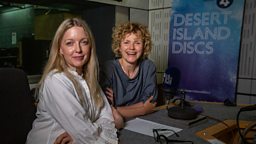Seven things we learned from Maxine Peake's Desert Island Discs
Maxine Peake was just 24 when she reached TV audiences of 12 million and more in the canteen sit-com Dinnerladies. She enjoyed further acclaim for her role in Shameless, and her portrayal of Myra Hindley, in a BAFTA-winning TV series – and since then she’s taken on a wide range of high-profile parts, including Hamlet on stage, and the Hillsborough campaigner Anne Williams.
Her path to success was far from straightforward: as a teenager, she was asked to leave a college drama course, and she was rejected numerous times when she applied to theatre-in-education companies and drama schools, before finally getting into the the Royal Academy of Dramatic Art (RADA) – although she initially thought the call offering her a place was a prank. Here’s what we learned from her Desert Island Discs...
-
![]()
Listen to Maxine Peake's Desert Island Discs
To hear new episodes with the full tracks first, listen on BBC Sounds.

1. Victoria Wood gave her a dream role early in her career – and some important advice
In 1998, not long after leaving RADA, Maxine was cast as Twinkle in the TV comedy Dinnerladies, created by Victoria Wood and set in a Manchester factory canteen.
I don't want to play Juliet! Who wants to play Juliet?
“Twinkle,” says Maxine, “was the sort of monosyllabic teenager who worked in the canteen. She was a joy to play - and what an absolute dream come true! I couldn't believe I was going to get to work with Victoria Wood. She was who I wanted to be growing up.”
“I saw her and I thought, ’She looks a bit like me. She sounds a bit like me. I could do that, maybe I could do that.’”
Victoria Wood also had some advice for Maxine: “Well, she basically said: ‘Look, you're blonde, you’re northern and you're big. You're going to get typecast.’... You know she felt that’s what had happened to her, you get typecast as a fat, funny northerner.”
2. Some of the guidance she received from drama teachers was less helpful
Maxine recalls that some teachers told her that her accent and her size at the time would be barriers to a successful career: “[I had] a few loggerhead moments... ‘You'll never go to the RSC, you'll never go to the National [Theatre]’… and I would never play Juliet if I didn't lay off the chips.”
She says she felt her own accent was central to her identity: “Your voice is very much who you are. It's a real connection for me. That's where your emotion comes from.”
And what about playing Juliet? Her response as a student was simple: “I don't want to play Juliet! Who wants to play Juliet?”
3. Her first disc evokes strong memories of her teenage years
“This was the first band I had a real obsession with,” says Maxine, “and they were probably the four most beautiful men I had ever seen in my life, the coolest men, but they had attitude and they really spoke to my teenage self.”
“I know I shouldn't really say this, but Liverpool for me was a city I'd much more connection with as a teenager than Manchester, so [this track] sort of marries those two elements.”
“I always felt Liverpool was a little bit more accepting. Going clubbing in Manchester I always felt a little bit awkward. I always felt Liverpool welcomed all-comers, it didn't matter what you were wearing, how cool you were. I just had some of the best nights and some of the best all-nighters out clubbing in Liverpool.”
The track that brings together the two cities is Mersey Paradise, by the Manchester band The Stone Roses.

4. Her mum was a strong early influence
“[Mum] was fearless,” Maxine recalls. “She'd take people on - and my mum always said she wasn't political, although I always used to say [to her]: ‘At heart Mum, you are a socialist.’”
It's such a privilege for people to let you into their lives
“I'd be at the bus stop, and it’d be raining and she’d drive past, and she’d shout: ‘Get in the car,’ and I’d get in the car, and she would wind the window down and say to the other people at the bus stop ‘Where you going? Where you going?’.”
“There'd be lots of wet, steaming strangers sat in the back of a little, battered old Mini driving into Bolton.”
5. As a child, performing was a way to connect with her parents
Maxine's parents split up when she was eight and she would see her dad sporadically, becoming an intermediary for her parents’ communications: “I used to come in and my dad would say: ‘Tell your mum I want to talk, I want her back.’ My mum would say: ‘Oh tell your dad to...’.”
“I think that’s why I became a performer,” says Maxine. “Initially it was to impress my dad, because when he was at home we used to watch a lot of comedy together, like The Goodies and things like that. And I remember watching him laughing and thinking, ‘I want to do that. I want to make people laugh.’”
6. Maxine gives a Greek progressive rock band their first-ever play on Desert Island Discs
“I've picked this,” says Maxine talking about her fourth musical selection, “because I love my prog rock. It's not always been cool to like prog rock!”
The track is The Four Horsemen by Aphrodite’s Child, who formed in Greece in 1967, and released this song in 1972, on their concept album 666.
“It really reminds me of a time recently when I got asked to join a band called The Eccentronic Research Council. They're such a good bunch of people and it's really silly and it's really anarchic and bonkers.” You can hear Maxine’s voice on The Eccentronic Research Council’s album 1612 Underture, of which the music website The Quietus said: “Its rich burr and skittering cadences make it a joy to listen to.”
And while Aphrodite’s Child remain very much a cult favourite in the UK, two of the band’s members later enjoyed global success as solo artists: Demis Roussos sold more than 60 million discs as a singer, and Vangelis became a leading electronic music composer, winning an Oscar for his Chariots of Fire score.
7. Re-creating real lives on screen has been a powerful experience
Maxine’s real-life roles have included the campaigner Anne Williams, whose son Kevin died in the Hillsborough disaster when he was just 15. Anne campaigned for years to uncover the truth about his death. Maxine recalls how Anne’s daughter, Sara, gave her a cigarette tin that Anne used, to keep in her pocket while she was filming.
“It's such a privilege for people to let you into their lives,” says Maxine, “so I get a little bit upset about it, but I feel very honoured that I'm allowed to dip my toe into people's lives who've been through such terrible trauma.”
“I feel very blessed that these roles have come my way and that the people who've been attached to them, friends and family, and the individuals themselves, have been so supportive and open and warm.”

More Desert Island Discs
-
![]()
Gillian Anderson
Sue Lawley's castaway is actress Gillian Anderson.
-
![]()
Stephen Graham
Stephen Graham, actor, shares the soundtrack of his life with Lauren Laverne.
-
![]()
Greta Gerwig
Greta Gerwig, writer and director, shares the soundtrack of her life with Lauren Laverne.
-
![]()
David Harewood
David Harewood, actor, shares the soundtrack of his life with Lauren Laverne.





